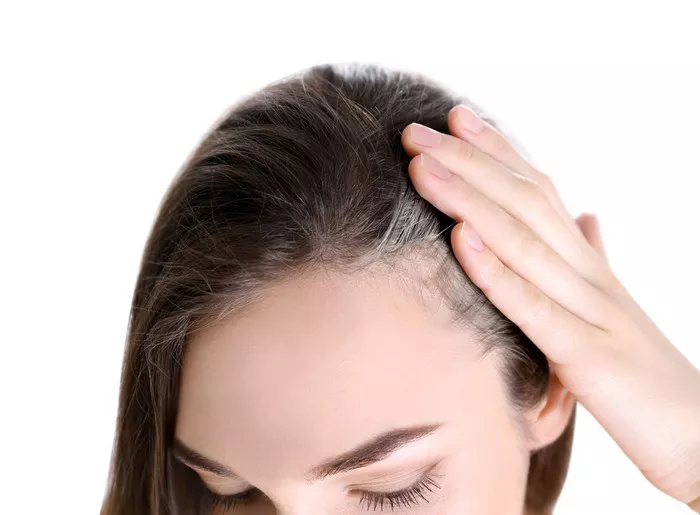Pregnancy is a time of significant physical changes for women, including changes in hair growth and texture. While many women experience fuller and thicker hair during pregnancy, others may notice hair loss or thinning. In this article, we will explore whether hair loss is a symptom of pregnancy.
The Causes of Hair Loss During Pregnancy
Hair loss during pregnancy can be attributed to several causes:
1. Hormonal Changes
Hormonal changes are the primary cause of hair loss during pregnancy. During pregnancy, the body experiences an increase in estrogen levels, which prolongs the growth phase of hair follicles and prevents hair from falling out. However, after delivery, estrogen levels drop, causing hair to fall out and leading to postpartum hair loss.
2. Nutritional Deficiencies
A diet lacking in essential nutrients such as protein, iron, and vitamins can lead to hair loss during pregnancy.
3. Stress
Stress can cause hair follicles to go into a resting phase, leading to hair loss.
4. Medical Conditions
Medical conditions such as autoimmune disorders, thyroid problems, and scalp infections can also lead to hair loss during pregnancy.
See Also: Does Lack of Sunlight Cause Hair Loss: A Quick Guide
When Does Hair Loss Occur During Pregnancy?
Hair loss during pregnancy can occur at any point, but it is most common during the first trimester. This is because the body is adjusting to significant hormonal changes, and the metabolism may not be able to keep up with the increased demand for nutrients.
How to Prevent Hair Loss During Pregnancy?
While hair loss during pregnancy is common, there are several things you can do to prevent it:
1. Nutrition
Eating a well-balanced diet rich in protein, iron, and vitamins can support healthy hair growth during pregnancy. Include foods like eggs, fish, nuts, leafy greens, and fruits in your diet.
2. Reduce Stress
Reducing stress through activities like yoga, meditation, and exercise can help prevent hair loss during pregnancy.
3. Hair Care Routine
A proper hair care routine is essential for maintaining healthy hair during pregnancy. Use a mild shampoo and conditioner, avoid excessive heat styling, and wash your hair regularly.
4. Prenatal Vitamins
Taking prenatal vitamins can ensure that your body receives essential nutrients necessary for healthy hair growth during pregnancy.
5. Consult a Doctor
If you are experiencing excessive hair loss during pregnancy, it is important to consult a doctor to rule out any underlying medical conditions.
When to Seek Medical Attention?
While hair loss during pregnancy is normal, excessive hair loss may be a sign of an underlying medical condition. Seek medical attention if you experience:
- Bald patches on your scalp
- Sudden hair loss
- Itching, redness, or inflammation on your scalp
- Scalp tenderness or pain
Treatment for Hair Loss During Pregnancy
There are several treatment options for hair loss during pregnancy:
1. Medications
Medications such as Minoxidil (Rogaine) and Finasteride (Propecia) can treat hereditary hair loss and promote hair growth during pregnancy. However, it is important to consult a doctor before taking any medications during pregnancy.
Hair transplant surgery involves transplanting hair follicles from one part of the scalp to another. While it is a viable option for treating hair loss, it is not recommended during pregnancy.
3. Platelet-Rich Plasma (PRP) Therapy
PRP therapy involves injecting platelet-rich plasma into the scalp to promote hair growth. However, it is not recommended during pregnancy.
Postpartum Hair Loss
Postpartum hair loss is a common occurrence, usually occurring between two to four months after delivery. As mentioned earlier, the sudden drop in estrogen levels leads to hair fall. Postpartum hair loss usually lasts for a few weeks to several months and resolves on its own.
Conclusion
Hair loss during pregnancy is a common occurrence due to the hormonal changes that occur during pregnancy. However, it can be prevented by maintaining a healthy diet, reducing stress, following a proper hair care routine, taking prenatal vitamins, and consulting a doctor if necessary. While hair loss during pregnancy is normal, excessive hair loss may be a sign of an underlying medical condition, so seek medical attention if you experience any unusual symptoms. Remember, postpartum hair loss is also common, so don’t be alarmed if you experience hair fall after delivery. With the right care and attention, you can maintain healthy hair throughout your pregnancy and beyond.


